Frances vs Sophie
 Wednesday, April 15, 2020 at 10:30AM
Wednesday, April 15, 2020 at 10:30AM 
With Sophie's Choice new to streaming on HBO NOW and Frances available to rent from Amazon, Youtube and others, we thought it could be fun to rehash one legendary Oscar race. It's when Meryl Streep and Jessica Lange battled out for the Best Actress trophy of 1982. Come explore this clash of acting titans as we investigate two great women's legacies, the pair of competing films and nominated performances in a detailed deep dive. In the end, who'll be the chosen victor?
THE CONTENDERS
Despite being the same age and having entered the movie business at relatively the same time, by 1982, Meryl Streep and Jessica Lange were viewed very differently by the public and the industry.
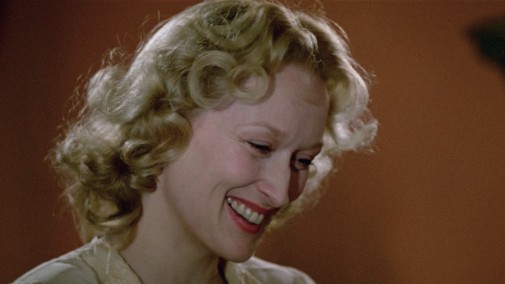
The theatrically trained Streep was a respected young thespian who had already amassed three Oscar nominations and one win. She'd even starred in two Best Picture winners (The Deer Hunter, Kramer vs Kramer), signaling her as a performer of great prestige. Thanks to various factors, Streep was always considered an actress first, a star second, her persona never tied to notions of glamour or ephemerous desirability. In the beginning, that may have hurt her, but this sense of respectability would prove valuable to her career.
However, before landing her first movie role in 1977's Julia, Meryl Streep's un-glamorousness would cost her the lead part in Dino De Laurentiis' King Kong remake. According to the actress herself, she was rejected by the producer for being too ugly. The role went to Jessica Lange, instead, who had been modeling professionally until then. That pricey adventure flick might have made Lange famous, but it also resulted in great infamy for the actress whose miscalculated performance was ridiculed by critics and general audiences alike.
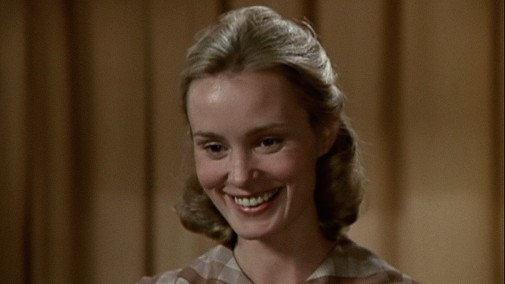
After years of inauspicious work, Jessica Lange in the early 80s was finally beginning to rid herself of the public persona of a dimwitted blonde with more beauty than talent. First, there was her turn as an Angel of Death in Bob Fosse's All That Jazz, and next a remake of The Postman Always Rings Twice for which she received some positive notices, though the role was still tied to the pervasive idea of a bombshell. Perceptions of Lange all changed in December 1982, when Frances and Tootsie premiered in the space of two weeks and proved to all that she was an actress of undeniable range and ability. The surprise factor also helped.
THE MOVIES
Adapted from a homonymous novel by William Styron, Sophie's Choice isn't the story of Zofia "Sophie" Zawistowski, no matter what the title may imply. She's not the film's true protagonist either, rather she's its subject matter. The actual protagonist of this sorry tale is Stingo, played by Peter MacNicol, a young wannabe southern novelist who's newly arrived in 1947's New York. It's through his eyes that we meet Sophie, a Polish concentration camp survivor, and her schizophrenic boyfriend, Nathan.
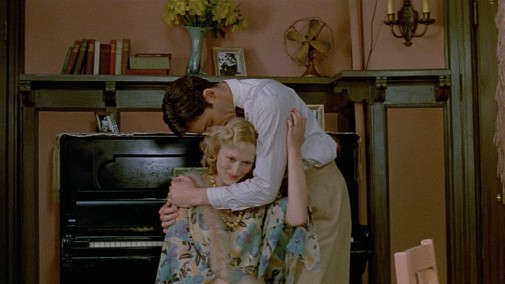
The problem with this structure is that Stingo is a deeply uninteresting figure whose sheer banality makes the detours into Holocaust remembrance feel out of place and exploitative. Because of her narrative placement, Sophie and her bottomless misery become plot mechanisms in Stingo's come-of-age tale. Her life thus reduced to a tragic chapter in a young man's biography.
The filmmakers at least seem aware of this. They are constantly bringing the camera back to Sophie, shooting Streep in close-ups for long stretches, inviting us to be as besotted with the actress as they are. Such an approach might work momentarily, but it doesn't fix the movies' textual problems and, surprisingly, neither Pakula nor any of his accomplished collaborators can spruce up the material into something aesthetically valuable. All in all, Sophie's Choice is an endless drudge, crass and borderline misery porn.
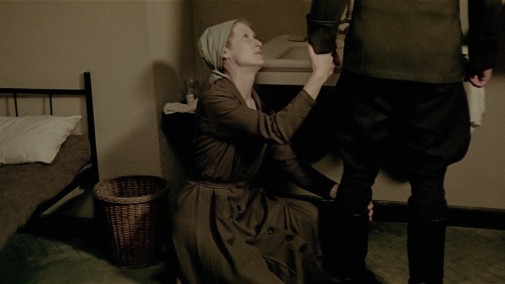
A generous viewer might see the film as an admittance of defeat when faced with the calamity of the Holocaust. Sophie is destroyed by her experiences, jumping into abusive relationships and self-martyrizing out of survivor's guilt. She goes to the extremes of rewriting her life story, lying even to herself. Nathan's dementedness, on the other hand, is fueled by the collective trauma of History. Together, they are a world destroyed by the evil of Humankind that the Holocaust laid bare.
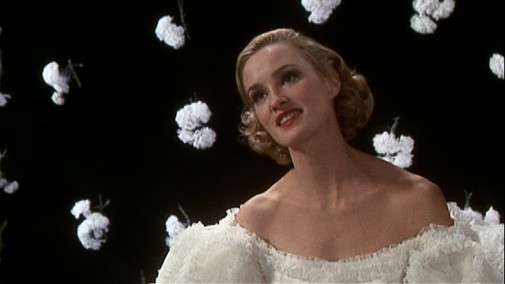
Quite obviously, I'm not a generous viewer for I find Sophie's Choice to be a deep dark pit of joyless mediocrity.
Not that Frances is a masterpiece, it must be said. Still, it's miles better than the Pakula flick. Telling the story of tragic Hollywood starlet Frances Farmer, this is a biopic that takes to heart the idea of printing the legend instead of the facts. Large portions of Farmer's biography are altogether omitted while some tragic events, like the film's memorable lobotomy scene, are pure invention.
That said, there's something in the picture that makes it come alive. It can be ham-fisted and shockingly unsubtle at times, but its emotional intensity makes up for that. During latter passages, when parental oppression and the horror of chauvinistic doctors turn Frances' life into a living hell, it's almost difficult to breathe. One feels suffocated by the agony onscreen and it's hard to disengage, to distance ourselves. The secret to Frances's success is, of course, Jessica Lange's titanic work, which brings us to the matter of the nominated performances themselves.
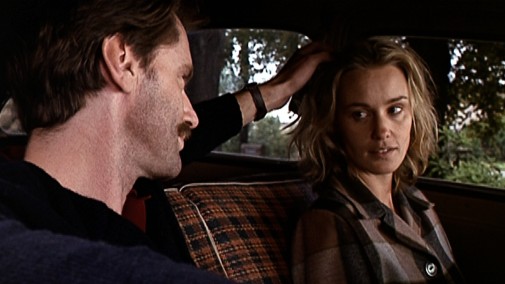
THE PERFORMANCES
Pasty, blond and often dressed in diaphanous fabrics, Meryl's Sophie looks like a ghost fluttering about in her Brooklynite abode. We first meet this spectral entity in the stairs of that pink-walled house, during a caustic fight with Nathan who screams at her with distilled vitriol. From minute one, she's a victim in the eyes of Stingo and the audience, a poor soul in need of rescue. However, it soon becomes clear that she's used to such violence and that this state of affairs isn't necessarily unwanted by Sophie, at least on a subconscious level.
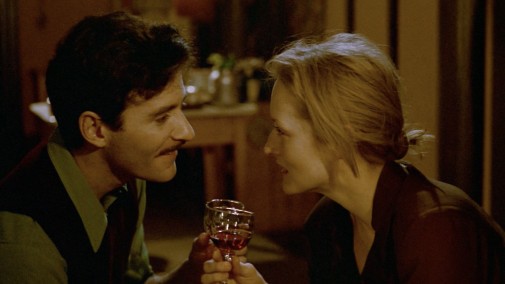
You see, Sophie doesn't love Nathan despite his disdain. She loves him because of it. In a way, he reflects what she believes is true about herself but doesn't dare verbalize – that she deserved to die and should be hated. In the day after that explosive fight, when the reconciled couple takes their newest acquaintance to an afternoon of goofing around in Coney Island, Streep peppers the enjoyment with notes of unrest. Sophie is often awkward, visibly forcing on a mask of cheeriness when she thinks it's appropriate. A longtime victim of domestic abuse, she is tentative around Nathan, constantly trying to find a safe path through his moods.
At the same time, it's because of his presence that we get to see rare flickers of genuine joy from her. During a sleepless night, she sits with Stingo telling the story of her arrest back in Nazi-occupied Poland, her face a sculpture of despondence. That is until she hears Nathan returning home after an unexpected absence. Then, she lights up and it's such a violent tone shift that it could induce whiplash. Streep, for her part, makes it feel natural, finding truth in her character's contrasts and incongruences. The difficulty of this effort is multiplied by the fact she has to do all this while performing an insane dance of linguistic fortitude.
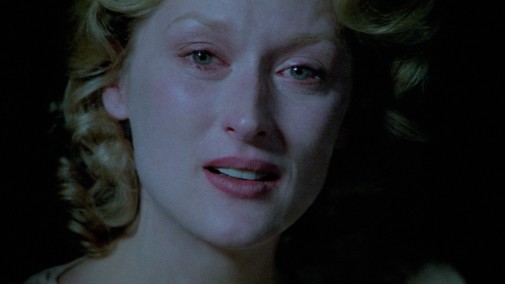
As Sophie, the actress spends most of the film talking in heavily-accented English, but, during the flashbacks, she also needs to express herself in Polish and German. I'm not fluent in either of those latter languages, but Streep's mastery of them has been mostly uncontested since 1982. Moreover, when speaking in her character's non-native tongues, she talks like someone who is translating everything in her head, breaking mid-sentence at precise moments. It's a studiously constructed miracle of acting.
There's very little that's intuitive about this performance, though. Everything but the Choice scene feels calculated to exhaustion but that suits Sophie, who's always negotiating difficult situations – either fictionalizing her life in censored reminiscence, dealing with a paranoid schizophrenic, placating the advances of a foolish boy or trying to manipulate people that can easily have her killed for so much as looking them the wrong way. Yes, we can see all the clicks of the mechanism inside her head, but that's perfect for Sophie. And yes, the Choice scene is as amazing as it is horrifying, a spectacle of sordidness.
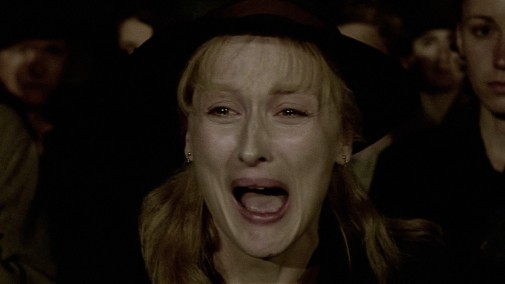
We witness as Sophie slowly realizes what's happening and then makes an impulsive decision. It's a nightmare and Meryl's silent scream, her face distorted into a vision of anguish by Edvard Munch, is unforgettable. She might be overstudied in the 1947 scenes, but we'd argue that's the point of the characterization. That is until she gives up the ghost and finally confesses her most shameful deed. It's fitting that only in that moment of unvarnished honesty, when her memory appears in its truest form, does Streep's performance lose the sheen of technical virtue and become something more savage, almost animalistic in its pain.
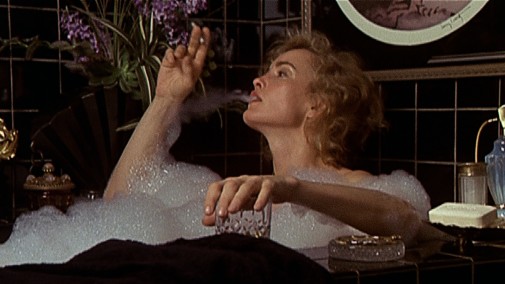
Speaking of savage, that's an apt description for Jessica Lange in Frances. If Streep sometimes feels like she's depending on too carefully balanced technique, Lange feels utterly overwhelmed. Her Frances Farmer is humanity unraveled, both as a woman inside the narrative and as a performance, as if Frances is taking hold of Lange like a demonic possession. After years hiding her trademark mercurial rage behind a veneer of shallow glamour, Jessica Lange finally lets it all hang out, defying anyone to turn away from this supernova of fire and fury, deep indignation and bottomless sorrow.
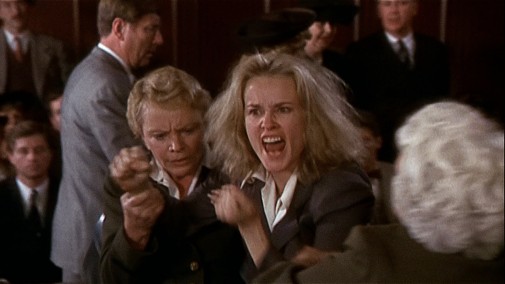
Such words can suggest a false dichotomy between Streep and Lange, painting one as an accomplished technician and the other as an inspired wild child with little finesse and a lot of feeling.
"I don't want to see you act desperate – I want you to BE desperate" is what Clifford Odets tells Frances in one of the movie's scenes. Lange follows the advice wholeheartedly. However, she doesn't sacrifice complexity to do so, nor does she create her characterization without some fine-tuned technique. It's a perfectly calibrated performance that only feels out of control.
In many ways, Lange, who takes the character from teenage innocence to midlife apathy, plays Frances as a woman whose body and mind are essentially disconnected. So many times, we can see her physicality telegraph something opposite to her facial expressions, her voice giving strange colorations to a dialogue that's otherwise performed with no perceived dramatism. By playing up these divorced facets of a person, Lange is making the audience aware of Frances' thinking, her mind, and her soul.
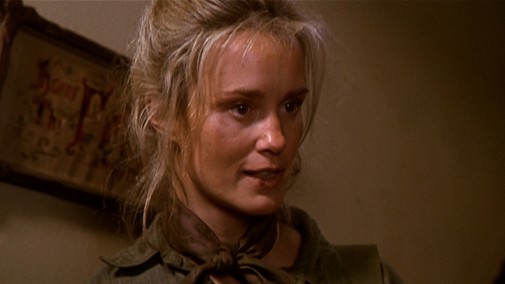
Early on, she is often tense and uncomfortable when dealing with authority figures, her eyes fidgeting about, brow restless and mouth quivering. Her lines express confidence, but the actress' face suggests silent doubt. Only when drunk on libertine abandonment, the passion of a crush or the self-righteous fury of an intelligent person living among idiots, does she calm down that persnickety bearing. In those rare instances, we see Frances and Lange giving themselves over to a single emotion, either relishing in it or using the feeling as a cannonball shot at their enemies.
This movie version of Frances Farmer is doomed by her intellect and she gradually becomes aware of this, growing out of her youthful insecurity into the melodramatic persona of a performer. However, such developments also come hand in hand with romantic disquiet and alcoholism, giving Lange new notes to add to her already complicated symphony. What she does with them is a miracle of feverish obstinance, turning a courtroom scene into a stage. Frances knows she's guilty but she also knows she's being discriminated against because she's female. Furious and loving the operatic buffet of the procedures, she knowingly surrenders to beastly hysteria. Lange plays this with gusto but always delineates these disparate layers of personhood.
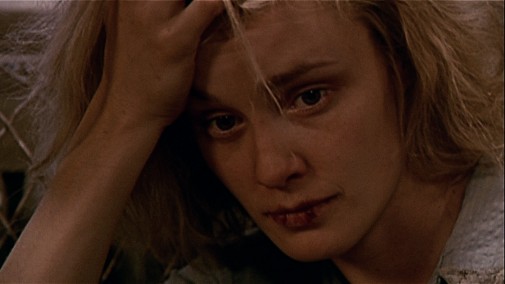
As captivating as she is bullish, the actress makes us understand why Hollywood still tried and tried again to deal with Frances Farmer. Even ragged drunk, her hair in disarray and face ashen, she's a star who we can never ignore. To see that bright charisma be systematically smothered by stints at draconian mental hospitals is a terrifying pageant of degradation. Jessica Lange doesn't spare the audience nor does she glamorize the ordeal, continuously finding new variations to Frances' despair. The structure of the movie may be repetitive, but its lead actress never is.
After many cycles of narcotized stupors, mother-daughter wars, and battered resignation, Lange and her movie arrive at their most famous chapter – the lobotomy. What horror there is, and there is plenty, comes from the stillness that overcomes Jessica Lange in these final scenes. For hours we've been drawn to the contrasts in Frances' inquisitive mind and electric constant motion. Now, there's only a sense of quiet numbness. Thanks to some good tricks of lighting, her eyes don't reflect anything, they're cloudy and empty. That kaleidoscope of pure feeling is gone, its absence a void as deep as the darkest black hole. To this day, I consider it one of the most frightening moments in cinema.
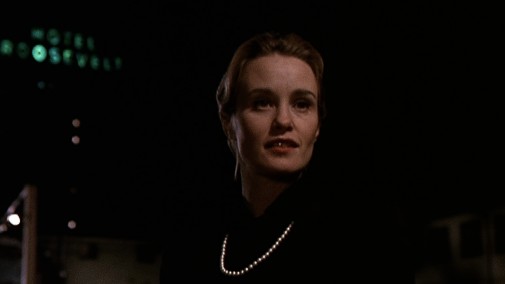
THE RACE
The truth of the matter is that, from the moment Sophie's Choice hit theaters, Meryl Streep had won the Oscar. Jessica Lange was Streep's runner-up, but her victory in Best Actress was always a near impossibility, especially when Tootsie gave the Academy a handy way of honoring both women. The New York Film Critics Circle was the first organization to devise a way of honoring both when they deemed Lange a supporting actress for Tootsie and gave her the corresponding prize. Most of the awards bodies that followed did the same, including the Academy, which doubly nominated Lange but gave her the gold for Tootsie.
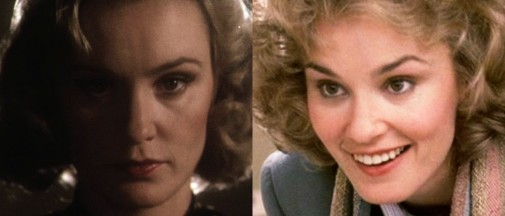
The other Best Actress nominees, regardless of their exemplary efforts, were non-starters. Missing was a much-ballyhooed polemic that brought with it the Palme d'Or and heaps of great reviews, guaranteeing Sissy Spacek a spot on the line-up. Still, she was never a contender for the win, having conquered the Best Actress Oscar two years prior for Coal Miner's Daughter. Julie Andrews was another previous winner and, in her case, the outré premise of Victor/Victoria as well as its perceived lightness as a musical comedy combined to rob her of any real chance at conquering the statuette.
As for Winger, she got the nod by starring in one of the year's most successful movies, An Officer and a Gentleman. In it, she gave a riveting performance which she would, nonetheless, top the very next year on the Best Picture-winning Terms of Endearment. Even Debra Winger's parents said that they were happy for their daughter but believed Meryl deserved the Oscar when they were interviewed for People magazine. The only person who seemed to be legitimately sour about the turn of events was Teri Garr who considered Lange to be the leading lady of Tootsie. After all, had Garr been the picture's sole nominee in that category, she probably would have won.
THE AFTERMATH
Both Jessica Lange and Meryl Streep have had luminous careers since this Best Actress showdown. The fading glamour that comes of age put a bit of a damper on Lange's movie career, but she quickly pivoted to TV where she has found work befitting her status and her talents. Before those small screen adventures, however, she'd still win a Best Actress Oscar in 1994 for Blue Sky. While not wanting to overstate the importance of Frances in the actress's history, it's safe to assume that her loss of the Best Actress prize back in '82 helped her win this second little golden man.
As for Streep, she is the most nominated actor in the History of the Academy Awards, and also a triple winner. They're both living legends.
WHO SHOULD HAVE WON?
It's surprising how difficult it is to articulate the wonders of Lange's performance in comparison to Streep's. The controlled nature of Sophie is perhaps easier to process than the primordial rage of Frances. In this case, I shall vote for the performance that most confounds and fascinates me, making Jessica Lange the rightful champion for Frances.
Who's your choice for the Best Actress of 1982?



Reader Comments (91)
Always and forever Meryl. As undeniable as Scarlett O’Hara and Blue Jasmine.
Meanwhile, what do you all think of Lange in Tootsie? I thought she is perfect in that role and very worthy of the win. But, even if Teri Garr was the only nominee from Tootsie, I still think they would have chosen Kim Stanley, the other Lange’s costar in the category.
The article states Jessica Lange plays the Angel of Death in All That Jazz.
This is inaccurate. The New York Times in its original review of the film erroneously labeled Angelique (Jessica Lange) as the angel of death. The label stuck.
The name Angelique comes from the French meaning - like an angel. The character is based on Fosse’s late second wife Broadway dancer Joan McCracken who Fosse attributes as a prime motivator of his decision to become a choreographer. Fosse was serially unfaithful in their near decade long marriage ultimately leaving her for marriage to another Broadway dancer Gwen Verdon.
Angelique, a ghost, resides in a deserted Broadway theater. During their conversations, Joe Gideon and Angelique utilize the cast aside props, sets and theater seats scattered in the room. More importantly as noted by McCracken’s biographer Lisa Jo Sagolla, the white, billowy gown with accompanying veils and oversized hat, worn by Angelique is a replica of McCracken’s costume from her final theatrical performance before her untimely death two years after the end of her marriage to Fosse.
When we understand that Gideon is engaged in a dialogue with his deceased ex-wife, the character’s relationship with women becomes more insightful. The sense of foreshadowing is more poignant.
Meryl, who's performance is out of the orbit. My absolute definition of a best actress win.
It has everything, even small glances of joy, hapiness, freedom and silliness, despite hinding the darkest secret of the most brutal "choice" (like it was no choice at all).
Kein Kline should have been nominated too that year! He was so charming in one and deeply scary the next moment.
Good read but I think Meryl is undeniable in Sophie's Choice. I've never quite been able to get past what a slog Frances is and how repetitive. I think Lange has great moments in it but not enough shaping... or variety (the script's fault i think but she doesn't 'fix' its problems).
My 1982 medalists would be
STREEP - gold
ANDREWS - silver
the bronze would be a true competition though it is a bit of a barren year in leading actress.
I think I'd go with Meryl. And Garr was right, Lange committed category fraud. And she's better in Tootsie. I think she's pretty ok in Frances, in a very sub-Susan Hayward way. Nothing new to see there.
James - I think Angelique can be both an Angel of Death and a ghostly vision of Joan McCracken, one doesn't necessarily exclude the other. I'd go so far as to say most characters in "All That Jazz" play two identities, those they live outside Joe's mind and the theatrical metaphorical apparitions inside his psyche. That's my opinion, of course, and, as you well point out, it's a highly debatable matter.
By the way, I didn't know that tidbit about the costume being representative of what McCracken wore for her last stage performance. Thank you for the fascinating insight and intelligent feedback.
Almost every single actress in Hollywood was considered for the role of Frances. It was almost the Scarlett O'Hara of the era. I don't see the ones who didn't get it voting for Lange... can't help being bitchy.
I don't remember what she said in her speech but Meryl owes a lot to Néstor Almendros in that movie. Her monologue is exceptionally lit.
Claudio, great post. These are two of the greatest performances of all time....so everybody wins!
Those two close-ups you chose...with Meryl looking like a Caravaggio and Jessica like a tortured modern Singer Sargent...are sublime. What great, great faces for the camera!
I have nothing to add to the best actress convo, but I want to note that Lange in Tootsie is one of my all-time fave supporting wins - and I guess I have Streep to thank for that.
You can't beat a Holocaust survivor specially when you play a Hollywood actress well-known for calling out all the Hollywood bullshit.
I lost to a grannie who kept farting at the backseast of her car.
Streep. H
My 1982 Best Actress choice would be Diane Keaton in 'Shoot the Moon.'
Acting is subjective from an audience's perspective, and while I admire both Meryl Streep and Jessica Lange, I never fell in love with either of them as performers. For me, they lack that intangible magic of my personal acting goddesses like Sissy Spacek and Isabelle Adjani and Gena Rowlands, or Diane Keaton when she has a role that's worthy of her.
Lange ended up being lucky that she lost Best Actress this year, because she still took supporting and it set her up for a lead win for Blue Sky years later, making her a two-time winner (a distinction I think is on the generous side).
It is and always will be Streep.
Lange's role in Tootsie is big but it's pretty clearly supporting, to me. The movie is all about Dustin Hoffman.
Streep all the way in 1982. One of the best Best Actress wins.
I'd personally rank the Best Actress nominees of that year like so:
1. Meryl Streep, Sophie's Choice
2. Julie Andrews, Victor/Victoria
3. Debra Winger, An Officer and a Gentleman
4. Sissy Spacek, Missing
5. Jessica Lange, Frances
Meryl's performance feels a bit incomplete to me. I would have added a couple of backflips to the Polish and the lost weight.
Lange for sure - and I'm tempted to rank Andrews above Streep for runner-up.
Where the fuck is Nick Davis?
"My 1982 Best Actress choice would be Diane Keaton in 'Shoot the Moon.'"
Agree, Mike.
Sophie's Choice and Frances both suck as movies, although Frances is probably worse. I'd say Lange's work in the latter is the textbook example of an actor giving a great performance in a bad film.
It's all about timing and your competition. Maybe Lange could have won in a different year, but Meryl's work here is simply undeniable, no matter what one thinks of the actual movie.
And while I love both these performances, neither movie is one you'd want to see over again.
I love them both! Why must I choose? lol
All I'll say is the "cool" thing is to answer Lange...
Streep, Lange, and Andrews all deserved nominations...but the real Best Actress of 1982 is Diane Keaton. Both her and Albert Finney should have won his and hers Oscars for Shoot the Moon. Such raw and marvelously lived in performances that are such a perfect pair.
Always and forever Lange.
Incidentally, Lange is the ONLY actress Meryl has admitted suggesting for roles she’s been offered. She’s also the only actress Streep has called “divine.” In fact, Streep has never mentioned another actress more than she has Lange.
Fast forward to 4 minutes...
https://m.youtube.com/watch?v=whqATHvd9Ew
I don't think 1982 is a particularly weak year in Best Actress. While the Oscar line-up was quite stellar there were plenty of other good choices among the eligible titles.
My nominees would have been:
- Diane Keaton, SHOOT THE MOON
- Jessica Lange, FRANCES (winner)
- Meryl Streep, SOPHIE'S CHOICE
- Barbara Sukowa, LOLA
- Rosel Zech, VERONIKA VOSS
Other good possibilities: Spaceck in MISSING, Andrews in VICTOR/VICTORIA, Winger in AN OFFICER AND A GENTLEMAN and Isabelle Adjani in QUARTET.
Some films that seem promising though I've not seen them yet: TEMPEST; COME BACK TO THE FIVE AND DIME...; A MIDSUMMER NIGHT'S SEX COMEDY; THE BEST LITTLE WHOREHOUSE IN TEXAS.
1982 the beginning of Close's losing streak.
Claudio,
Sandy Dennis, Karen Black and Cher were ROBBED.
If I had to pick a Best Actress winner other than Lange or Streep, it would be Sandy Dennis in Jimmy Dean. She was sublime!
Cher would be my winner in Supporting for her brilliant turn in Come Back to the Five and Dime Jimmy Dean, Jimmy Dean.
I actually think Meryl is OTT in Sophie's Choice and the film is a bore,alternately Diane Keaton in Shoot the Moon.
La Streep all the way! This is yet another anti-Streep read here.
But let's say this: to me Streep is the actor Lange would never be. Lange is always over the top. Streep is smart and this is her major gift as an actor. Her Sophie is undeniable. Streep is luminous in this role; she's sexy, fragile, funny, deeply physical, sensual, full of passion, and ultimately heartbreaking.
No one ever discusses how great Lange is in The Postman Always Rings Twice she's better in it than half of her nominated performances and I think that film helped change perceptions of her and the Jack effect,he gets good things from his leading ladies,they step up so not to be outshone.
Best Actress:
1) Keaton/Shoot the Moon
2) Andrews/Victor Victoria
3) Sukowa/Lola
4) Streep/Sophie's Choice
5) Lange/Frances
Supporting Actress:
1) Cher/Come Back to the 5 and Dime, Jimmy Dean, Jimmy Dean
2) Rowlands/Tempest
3) Burnett/Annie
4) Ann Waren/Victor Victoria
5) Garr/Tootsie
But OMG what a great year for acting! This was truly hard to narrow down (but also kind of not)
Zooey -- While I prefer Lange in the 1982 race, I love Streep's work too and tried to elaborate on its many wonders. How is this piece an anti-Streep read?
I'm sorry if this comes off as combative, I'm just curious in what regard do you believe I should have used other phrasing so as not to be "anti-Streep". I even attempted to contextualize why the over-studied nature of Meryl's performance, which is something some people complain about, is an integral part of the characterization.
If it came off as anti-Streep, I apologize, Be assured that it wasn't my intention whatsoever.
Zooey,
You call this an anti-Streep read” and yet your main point is to belittle Lange’s well-established and well-rewarded gifts and talents.
Seems like you’re just anti-Lange to me.
It’s a common flaw amongst the challenged.
My Best Actress win that year is Sandy Dennis with Jessica Lange coming in close second.
please do close vs Cher in 87, I know close in actuality was probably 4th in voting , after Kirkland and hunter but then maybe do an entire 87 best actress piece , forever in your debt : )
Jessica Lange is the winner. One of the greatest performances ever committed to screen. From the smallest moments to the fiery emotions unleashed, there is not one false note. Just supernatural talent on display.
Streep is fantastic, but there is a mannered approach and insistent opaqueness that are ultimately distracting.
In total agreement that Keaton should have been nominated for the terrific Shoot the Moon, along with Albert Finney.
also to another point can we have a definitive best actress nominations and winner list for every year from Nathaniel and Claudio ....we know you have made the lists : ), although I admit this might take away from the books you should publish on the matter !
please do close vs Cher in 87, I know close in actuality was probably 4th in voting , after Kirkland and hunter but then maybe do an entire 87 best actress piece , forever in your debt : )
I saw both of these wonderful actresses in the theatre in 1982. That doesn't make my take more definitive, it just means I have the perspective of seeing them when they happened.
I will always go with Meryl for the Oscar, the film (and the book) were a slog but the part of Sophie could have gone so wrong. People were just waiting for this film to see if any actress could pull it off. And when Streep did it, with all the requisite accents, her legend was truly formed and permanent. I was astounded by that performance and I still am. (Btw. I was with 2 pregnant women while watching "the choice" scene, I will always remember the audience reaction). So, Meryl Streep won that Oscar far and square.
As for Jessica Lange, I loved her in All that Jazz, and admired her in The Postman Rings Twice, but watching her try to bring Frances to life was gruelling. Too repetitive, and impressive in parts is the kindest thing I can say. It was so much easier to just love Lange in Tootsie, and give her an Oscar for that instead. Barely anyone went to Frances, it was a performance that you heard was good in a movie that was not great.
Mike - I'm glad to hear that someone else besides me appreciates Diane Keaton in Shoot the Moon, too bad the film wasn't a hit. Keaton should have been nominated, but what Meryl Streep did was break new ground in the acting world. She set the bar for those who followed.
Totally disagree with the write-up. I could tell by the second paragraph of THE MOVIES section that you were going to choose Lange.
I have to agree with Zooey above. Streep is undeniable in this role. It may not be the best film ever but the performance is one of the best ever recorded on film.
brandz & zooey -- agreed that Streep was undeniable that year but there will always be outlier opinions on performances. It's part of what makes movie-watching so beautiful... you just never know who is going to love what and why. And even unaninomous feelings (like Streep in Sophie's Choice) are never truly *unaninmous". I like a diverse array of opinions but I dont even think that Frances is Lange's best performance!
everyone -- it was not intentional to have two Jessica Lange centric posts back to back. lol.
Top 5 Jessica Lange performances (film or TV) and go!
Bhuray -- for Lange it's like this for me
1) MEN DON'T LEAVE
2) TOOTSIE
3) FRANCES
4) CRIMES OF THE HEART
5) BIG FISH
I have not seen "the postman rings..." or "sweet dreams"
Streep takes this easily for me.
Teri Garr should have won BSA.
Well Nat you have time to catch up on your Langography.
My Ballot for both Lead and Support are these
Diane Keaton Shoot the moon
Jessica Lange Frances
Sissy Spacek Missing
Glenda Jackson Return of the Soldier
Meryl Streep Sophie's Choice
Kim Stanley Frances
Lesley Ann Warren Victor/Victoria
Jessica Lange Tootsie
Claire Trevor Kiss me Goodbye
Ann Margret Return of the Soldier
I always forget that Grey Gardens never made it to cinemas... Sandra Bullock should be forever grateful, because Drew Barrymore would have taken that “who knew?” narrative and swept the season...
That performance in Sophie's Choice has everything an actor would want to conquer. It's my pick for greatest performance ever.
Also - that photo of Streep and Lange with Oscars is pretty iconic - and rare. Lawrence/Hathaway might be in the same ballpark. We'll see in 10 years.
Top 5 Jessica Lange performances (film or TV) and go!
***
1. Frances
2. Feud: Bette & Joan
3. The Postman Always Rings Twice
4. Music Box
5. A Thousand Acres
Special Mention: Titus, Normal, Tootsie, Country, Blue Sky, Grey Gardens